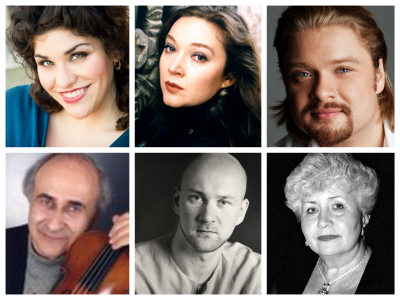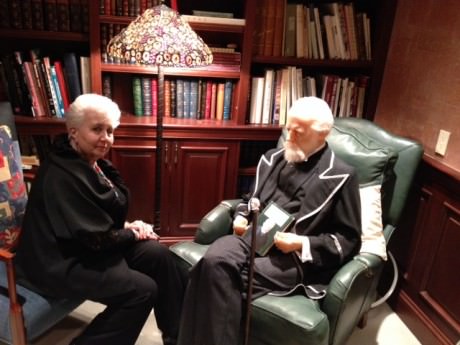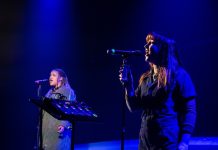Say “Tchaikovsky,” and as Christmas creeps ever closer, be it excitingly or inexorably, visions of sugar plums, graceful ballerinas in sparkles and white tulle, and softly falling faux snow begin, invariably, dancing festively in our heads. For the Russian Chamber Art Society, the composer’s music has more than a seasonal reason, or even an (equally celebrated) symphonic one, deserving a reserved place at the table in the rarefied realm of the art song. At Friday night’s tribute at the Austrian Embassy to his contributions to that genre, a prelude to the celebration of his birth 175 years ago this spring, five impressive soloists and their equally exceptional accompanist made a masterfully persuasive case for it.

Bottom L to R: Victor Danchenko – Violin, Alexander Shtarkman – Piano,
and Vera Danchenko-Stern – Piano.
Soprano Natalia Conte and mezzo-soprano Susana Poretsky, with Vera Danchenko-Stern, the organization’s founder and artistic director, at the piano, opened the concert with a duet from Tchaikovsky’s rarely heard opera The Queen of Spades. The three artists communicated not only musically, but artistically and emotionally, the sopranos’ soaring lines and focused tones firmly anchored by their attentive accompanist, who seemed at times to almost breathe with the singers. This phenomenon, as unusual as it is gratifying, would be evident throughout the concert.
In “Polina’s Aria” from the same opera, Poretsky’s mien bespoke the character’s unfolding misfortune, her rich voice infused with melancholy, culminating in a clear, impassioned, ringing high note of despair. “Lisa’s Aria” offered Conte the chance to express a young woman’s conflicting emotions when faced with imminent marriage to a man she doesn’t love and the fateful appearance of a handsome stranger. Conte captured the mood well, her concluding high note (at least one of which would appear in every aria, feeding, as Tchaikovsky knew, one of the key, if not ravenous desires of the opera lover) ringing the rafters with clarity and triumph.
Tenor Viktor Antipenko, continuing the drama with “Hermann’s Aria,” joined Conte onstage to avow his eternal love, imploring both Lise and heaven to “be merciful as I die” should she spurn him. The tuxedoed Antipenko (the women were gowned), his fair hair and mustache, blazing blue eyes and heroic stance making him the picture of Romantic Russian chivalry, nailed “Kuma’s Aria,” his own top note an achingly, gloriously searing lament.
Perhaps knowing that the audience would need something soothing, the program took a turn for the instrumental. Violinist Victor Danchenko (brother of Vera Danchenko-Stern) entered to play two beloved Tchaikovsky pieces, “Meditation” and “Waltz-Scherzo.” While not note-perfect, he pulled them off with panache and brio, finishing the second of the two with a series of showpiece-caliber cadenzas. As a bonus for those of us of a certain age or inclination, Danchenko’s appearance and demeanor kindled a quiet thrill. Clad in a satin-lapelled tuxedo complemented by an eggplant-colored tie and matching cummerbund, his white hair slicked back from the crown, accenting his angular features and intense expression, it was if he’d stepped from the one of the frames of the classic forties film Carnegie Hall.
The three singers returned with solos from The Enchantress, Maid of Orleans and Eugene Onegin. Conte dispatched another impossibly high note with élan in the first, while Poretsky took the adjective “operatic” to its farthest reaches in Joan’s aria, declaiming resoundingly the Maid’s unflinching commitment to her mission, and bidding a penetrating farewell to the places and things she loves.
As to Antipenko, he owned “Lensky’s Aria,” his golden tones edged in soldered brass, his delivery so heartfelt, so incisive and so uncompromising, it was as if he had become Lensky, and was demanding that we tell him “Where, oh where have you gone, golden days of my youth?” and respond to his perfervid calls to his beloved, to whom he had “devoted the sad dawn of [his] storm-tossed life!” This writer found tears coming to her eyes even before she looked at the translation. When she did . . . it was all over for her. Fortunately, the first half of the program was also over, allowing those of us who’d been swept away by the sounds and emotions of the preceding hour to gather our forces in preparation for part two.
The second half of the program began with two contrasting songs each by the soprano and the tenor. “So Soon Forgotten” and “Whether Day Reigns” were both beautifully done, with Conte capturing the joy of the second as effectively as the wretchedness of the first. With “Coral Beads” Antipenko went from passionate anticipation to the depths of despair, from a clarion top note to a muted disbelief and then, acceptance; then held nothing back in an explosive paean to the glories of his loved one in “No, I Will Never Name Her.”
Pianist Alexander Shtarkman took the stage to play selections from The Seasons, moving effortlessly from the reflective “October, Autumn Song” to the conviviality of “November, Troika” and the familiar sounds of holiday pleasures in “December, Christmas.” In all three pieces Shtarkman’s playing was fluid and focused, the discipline never taking away from the sheer joy he seemed to feel, but which was in fact communicated through sentiments clearly articulated and executed.
“None But the Lonely Heart” was sung (as the rest of the program) by Poretsky in Russian. While she did a commendable job, and the music was written for mezzo-soprano voice (the verse translated from a poem by Goethe), this writer unfortunately couldn’t help hearing as a subtext the cello transcription that forms the telling, richly moving background music of the 1944 film of the same name.
Poretsky made the next number delightfully her own, tossing off “Pimpinella (Florentine Song)” with a flourish, clearly enjoying both the song’s cheeky supplication of the apparently as-yet-uncommitted boyfriend, and signing it in the original Italian.

Concluding the program, the three singers joined in “Sunrise,” which, appropriately, gave each of them a brilliant high note to leave us with. And a wave goodbye in the song’s concluding line: “Say your prayers and let’s hit the road!”
Running Time: Two hours, including one intermission.
Tchaikovsky is Forever: Operatic Arias and Romances was performed for one-night only on Friday, December 5, 2014, at 7:30 p.m. at The Russian Chamber Art Society performing at The Embassy of Austria – 3524 International Court NW, in Washington, DC. For information on future concerts, go to their website.




